#caribbean music magazine
Explore tagged Tumblr posts
Text
Examining the Beats: An Adventure with Caribbean Music Magazine

Greetings from the lively realm of Caribbean music, where melody, rhythm, and culture come together to produce an unmatched musical experience. We take you on a rhythmic journey through the many sounds and rich traditions of the Caribbean islands in this first issue of our Caribbean Music Magazine. Join us as we celebrate the soul of the Caribbean via thought-provoking articles, rare interviews, and engaging features featuring everything from reggae to soca, calypso to dancehall. Disclosing the Melodic Tapestry: A Synopsis of Caribbean Music History Take a trip back in time to discover the origins of Caribbean music, from its African and European forebears to its development into a worldwide sensation. Discover the important musical subgenres, recognizable performers, and turning points that have influenced the Caribbean's dynamic musical scene.
The Ascent of Caribbean Carnival Music, or Soca Sensation Explore the vibrant world of soca music, which serves as the throbbing soundtrack for carnivals around the Caribbean. Discover the history, rhythmic components, and cultural relevance of this genre while we highlight the musicians and anthems that evoke the spirit of carnival throughout the Caribbean and beyond. Reggae Revolution: Examining the Musical Heritage of Jamaica Visit Jamaica, the birthplace of reggae music, to learn about the genre's continuing legacy. Discover the lives and songs of reggae's trailblazing pioneers, from Bob Marley to Buju Banton, as we examine the genre's enormous influence on music, society, and social change.
Island Grooves: Examining the Variety of Music in the Caribbean Explore the diverse range of musical styles that are prevalent throughout the Caribbean islands by venturing outside the borders of Jamaica. Dive into the variety of sounds and customs that characterize Caribbean music, from the mesmerizing pulses of Cuban salsa to the contagious rhythms of Trinidadian calypso. Highlighting Caribbean Musicians: In-depth Conversations and Features Discover some of the most remarkable artists in the Caribbean up close and personal through our exclusive interviews, behind-the-scenes looks, and in-depth articles. Learn about the inspiration behind the music and the enthusiasm propelling the Caribbean music scene ahead from up-and-coming artists to seasoned pros.
As we come to the end of this first edition of Caribbean Music Magazine, we cordially encourage you to delve further into the region's rhythmic treasures in future issues. Come along on this musical journey with us as we explore the rich history, dynamic inventiveness, and contagious rhythms of Caribbean music—whether you're an experienced fan or a curious newbie. Get in touch with us to find out more!
0 notes
Text
Paul and drums
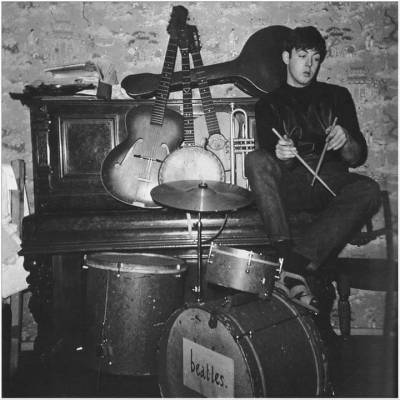
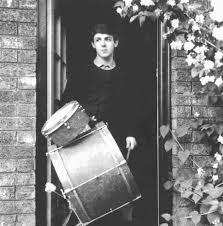
Our kid was first in a group with John called Quarrymen, and apparently, I’d forgotten the set of drums fell off the back of a lorry, as we say in Liverpool, and landed up in our house. So I was learning drums, and one of the Quarrymen came back and said, ‘I remember you’re coming down the house, and it was great when you played drums for us.’ I said, ‘Did I?’ I’d totally forgotten. But then I realized why I forgot. It’s because I broke my arm in a scout camp, and this hand dropped. It was dead, paralyzed. So it took several years to get it back, and at that time, those drums that I was learning on, first of all, my brother, no wonder the drums on the band on the road are good. That’s where he learned it from my drums. But I couldn’t play anything then. So I’d forgotten that I was even the drummer, and Ringo got the job.
(Mike McCartney)
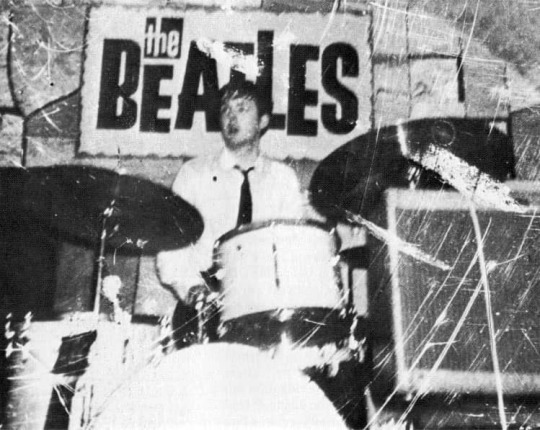
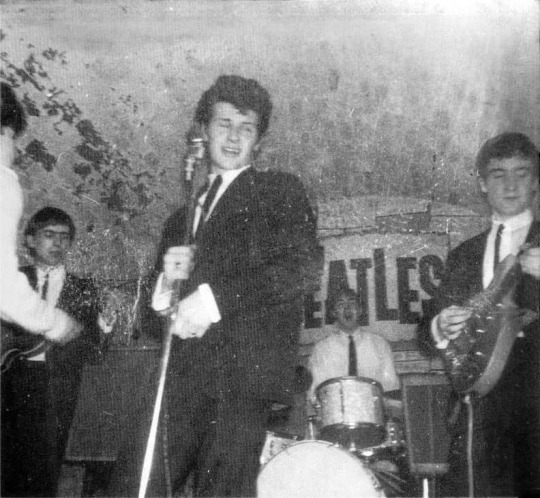
Mersey Beat Founder and Editor, Bill Harry wrote a guest column for Beatle Fan Magazine in 2019. He stated “For their August 7, 1961 gig, the Litherland Town Hall classified advertisement in the Liverpool Echo carried the message: ‘Hear Pete Best Sing Tonight.’ Best had been talked into performing the song “Pinwheel Twist,” which Paul had written for him to sing. Pete recalled in a conversation with Spencer Leigh: ‘Paul wrote the song and asked me to do it. He coupled it with Joey Dee’s hit “The Peppermint Twist.’ I used to get up and do the twist onstage and Paul played my drums. It was a little novelty act and it went down well with the fans. When The Beatles performed it, Paul took over on drums, George played Paul’s left-handed bass right-handed and Pete sang.”
(Source)
I used to get on Pete’s case a bit. He’d often stay out all night. He got to know a stripper and they were boyfriend and girlfriend. She didn’t finish work until four in the morning, so he’d stay up with her and roll back at about ten in the morning and be going to bed when we were starting work…
(Paul McCartney, Anthology, 2001)
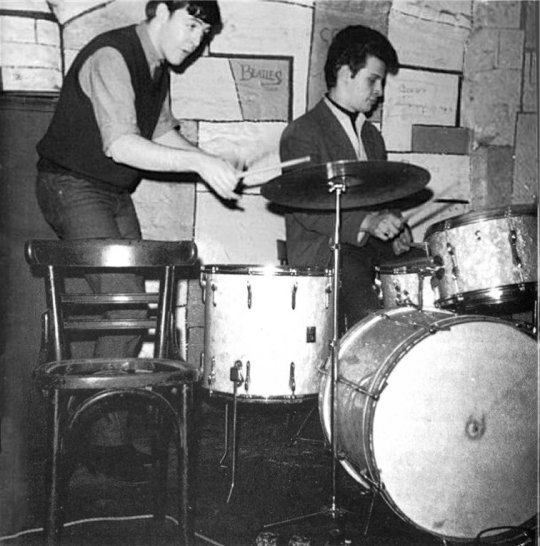
Q: When did you first play drums? A: My first recollection is in Hamburg. You’d get behind the kit to try and show the drummer what you wanted. That gradually grew to messing around on other people’s kits, which were lying around because there were a lot of groups playing in the places we played. You picked up the simplest beats very naturally. I remember one evening when Tony Sheridan’s drummer didn’t show up, so Tony said, “Come on, man, sit in!” I said, “No way! I can’t do this.” And he said, “Yeah, you can.” So I did it and then I was thinking, “Well! I’ve actually done a professional drumming gig!” Later, with The Beatles, there was a period where John, George, and I operated as a trio and picked up little bits of work. I remember playing in an illegal club in somebody’s basement on Upper Parliament Street in Liverpool’s Caribbean Quarter. One day this guy called Lord Woodbine, who ran the club, asked if we’d come in and accompany this stripper called Janine. We said, “Wow! Yeah, man! There’s a job.” He even paid us money. Q: It sounds like you would have paid him for that gig. A: Exactly [laughs]. So she came in and said, “Okay, I need you to play Ravel’s Bolero.” We said, “Oh, gee. Sorry, luv. We don’t read music. But we’ve got ’Raunchy.’ That might do.” I had somebody’s old drum kit, and I sat there with a broomstick between my legs, with a microphone tied to it so I could do a bit of vocals and drum at the same time. It was hilarious.
(Paul McCartney, interview with Robert L. Doerschuk for Drum!Magazine, 2005)
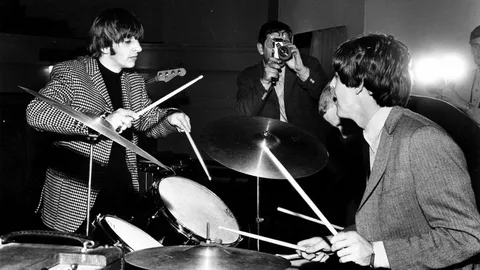
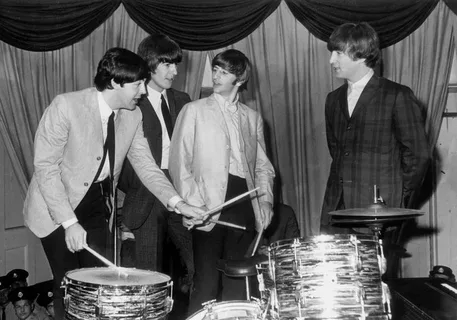
Q: When Ringo joined the band, that must have interrupted your emerging career on drums. A: Yeah, I was completely redundant. We loved Ringo so much. He was our favorite drummer in Liverpool, and when he joined the band, it was an explosion: Every song sounded new and fresh. He could pass what we felt was the true test for drummers, which was to be able to play “What’d I Say” — the cymbal work and the toms.
(Paul McCartney, interview with Robert L. Doerschuk for Drum!Magazine, 2005)
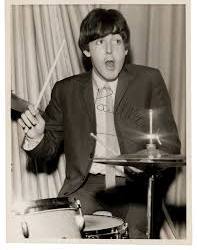
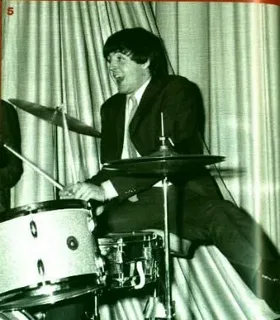
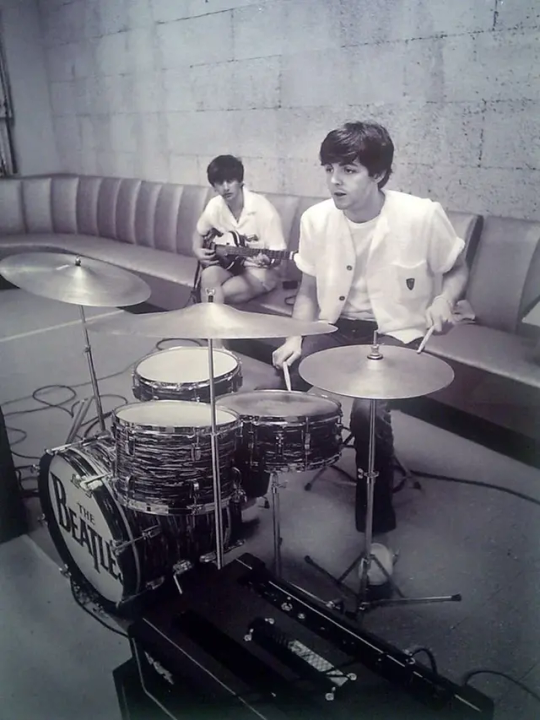
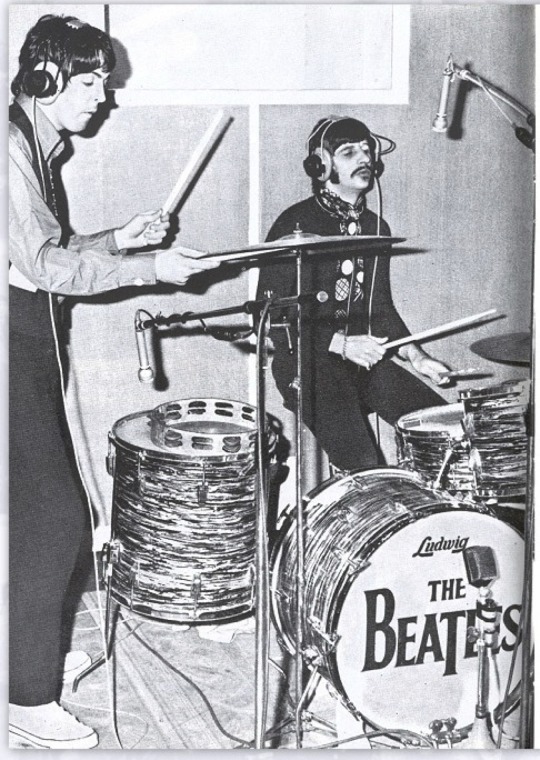
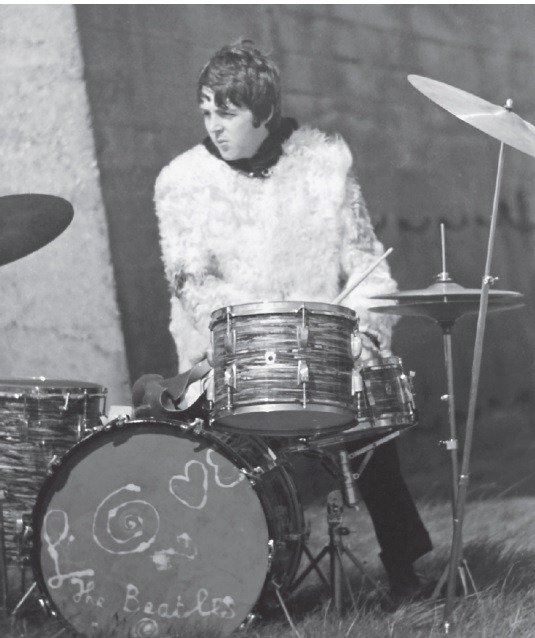
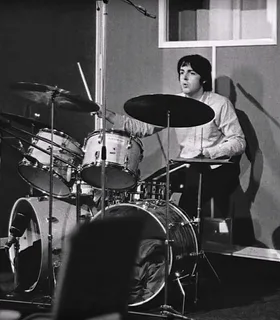
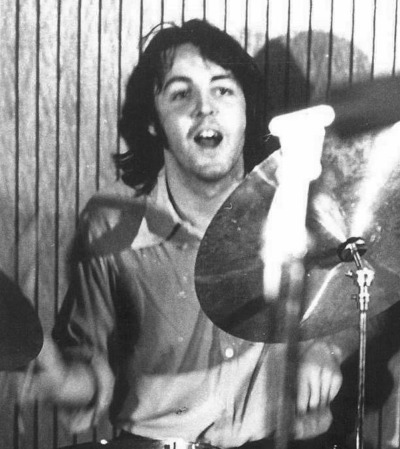
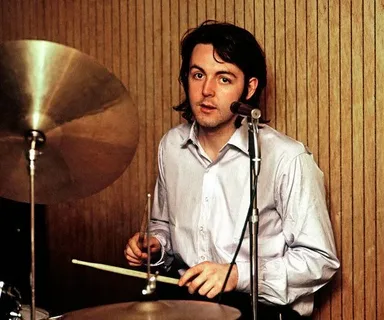
We did do a few little bits and pieces together before we all went our separate ways. John and I and Yoko did ‘The Ballad of John and Yoko’. He enlisted me for that because he knew it was a great way to make a record. ‘We’ll go round to Abbey Road Studios. Who lives near there? Paul. Who’s going to drum on this record? Paul. Who can play bass? Paul. And who’ll do it if I ask him nicely? Paul.’ He wasn’t at all sheepish about asking. He probably said something like, ‘Oh, I’ve got this song I want to record. Would you come round?’ And I probably said, ‘Yeah, why not?���
(Paul McCartney, The Lyrics, 2021, about Dear Friend)
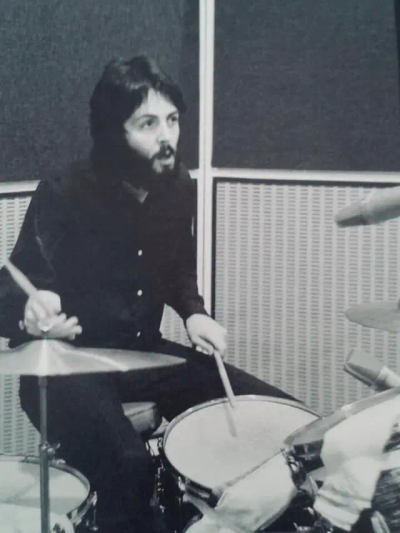
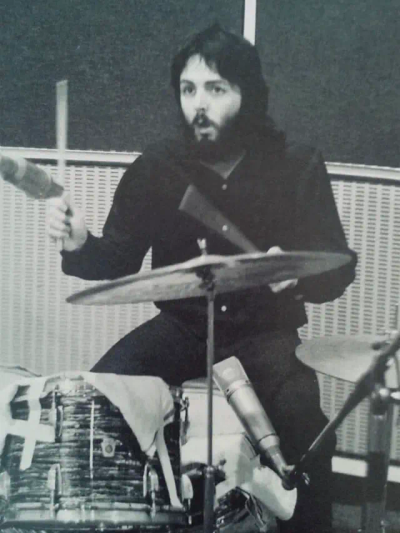
Steve Miller happened to be there recording, late at night, and he just breezed in. ‘Hey, what’s happening, man? Can I use the studio?’ ‘Yeah!’ I said. ‘Can I drum for you? I just had a fucking unholy argument with the guys there.’ I explained it to him, took ten minutes to get it off my chest. So I did a track, he and I stayed that night and did a track of his called My Dark Hour. I thrashed everything out on the drums. There’s a surfeit of aggressive drum fills, that’s all I can say about that. We stayed up until late. I played bass, guitar and drums and sang backing vocals. It’s actually a pretty good track. It was a very strange time in my life and I swear I got my first grey hairs that month. I saw them appearing. I looked in the mirror, I thought, I can see you. You’re all coming now. Welcome.
(Paul McCartney in Many Years From Now by Barry Miles, 1997)

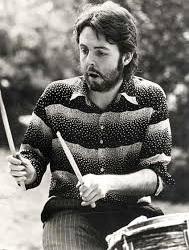
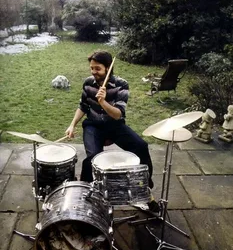
I really had to ask myself, “Do I want to give up music, or keep going?” I got a four-track Studer recording machine, like the Beatles used for Sgt. Pepper, put it in the corner of the living-room at my house in London and tried a very simple technique of just plugging directly into the back, not going through a mixing desk. It’s a cool way to record because it’s pure. If, say, I was doing a drum track, I’d play the drums, record it with one microphone, listen to it back, move the mike a little if there wasn’t enough hi-hat or cymbal, and then re-record. Then I’d add bass by plugging the mike into track two and overdubbing while listening to track one through headphones. I’d do that with all with four tracks. It was very hands-on, primitive way of working. <…> It was funky, and still sounds good to me.
(Paul McCartney, “Wingspan” documentary, 2001)
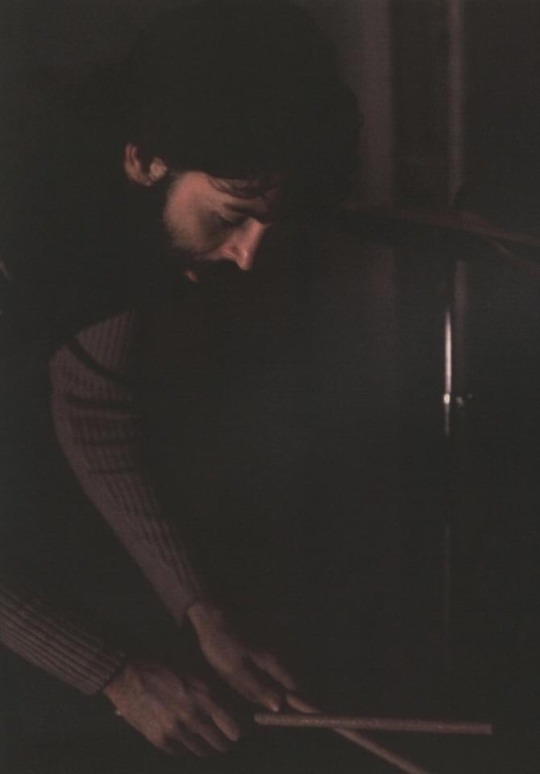
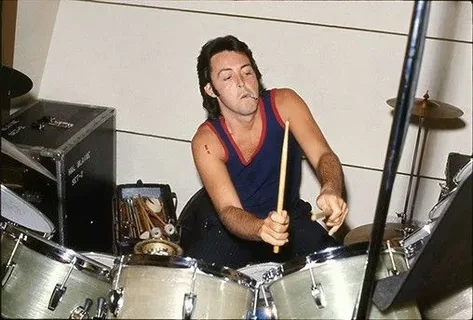
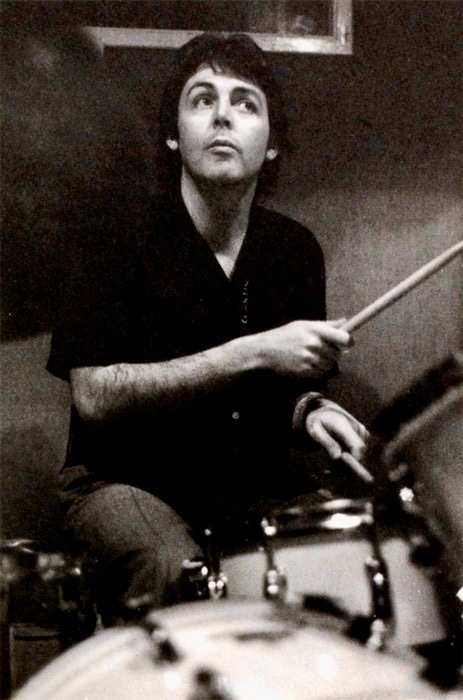
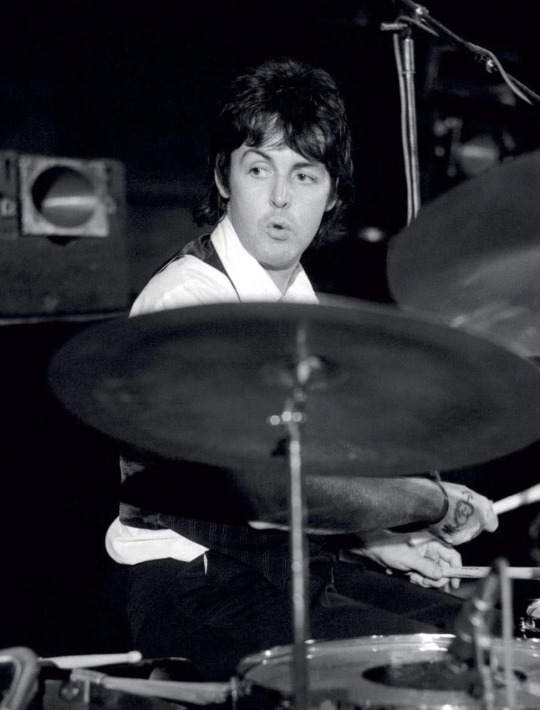
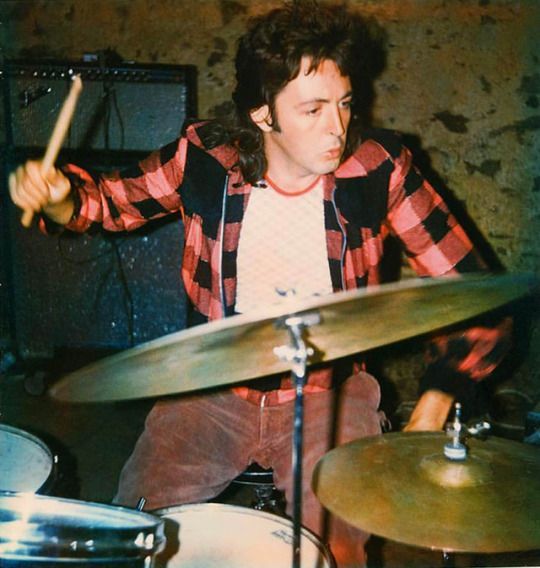
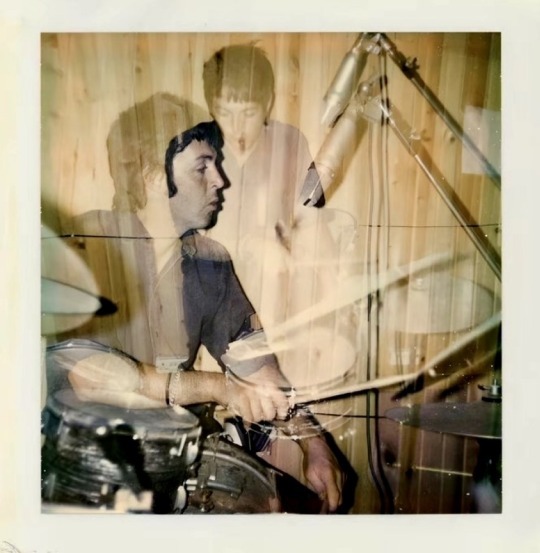
We did not see Ringo until the next night when he arrived at the session. He walked in and went straight to his drums…fiddled with them, then fiddled with them some more. “Somebody did something to my snare drum,” he said irritably. “Paul was here last night. He played them,” explained John. “He’s always fucking around with me things!” It sounded as though Ringo were back in Liverpool and all of them were still teenagers and nothing in their lives had changed. I realized then, that no matter what might happen among them, this was the way they would always relate to each other.
(May Pang, Loving John, 1983)
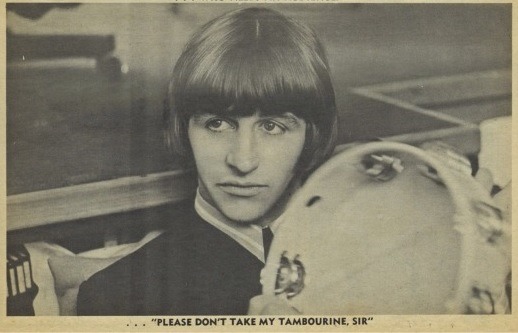
(Krla Beat, pic by lisamarie-vee)
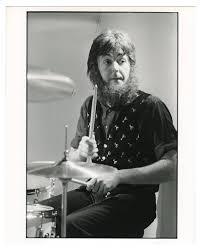
So, I got into my studio in Scotland and started working, doing the drum track. I normally start with the drums. I sometimes use drum machines, but I like to redo it with real drums. I enjoy drumming. Then I put some bass on it. I was just doing an experimental thing. I was messing around and experimenting. Slowing down tapes, or speeding them up.
(Paul McCartney, The Lyrics, 2021, about Coming Up)
Paul and I were in England, having dinner together [along with our wives]. I told him I was making an EP, and I said, “Why don’t you write me a song?” He wrote the song [Feeling the Sunlight] and put bass on it, he put piano, he put the drums on — and I had to take the drums off. [Laughs.]
(Ringo Starr, interview with Rob Tannenbaum for AARP, Nov 2023)

George was the first one to make a solo album [Wonderwall Music], and I was the drummer. John started the Plastic Ono Band, and I was the drummer. Paul likes to play drums himself, or I would’ve been on his albums too.
(Ringo Starr, interview with Rob Tannenbaum for AARP, Nov 2023)
youtube
Q: As strong as you are on bass, keyboards, guitar, and as a singer and writer, is it frustrating to play your drum parts at a more limited level? A: That never intimidates me, though it probably should. I just have so much enthusiasm when I do things that I don’t even consider it. I’m lucky, because some people would wrack themselves with doubt, but when I came to this project I was like, “Man, let’s just have a bit of fun!” It didn’t occur to me that I was some idiot jumping on the kit. I know that a lot of drummers can play rings around me, but as long as I keep it simple and don’t get too flash, I can play with a steady, swampy feel, and that’ll do the job.
(Paul McCartney, interview with Robert L. Doerschuk for Drum!Magazine, 2005)

@i-am-the-oyster, I hope you will enjoy :)
+ this
#paul mccartney#ringo starr#mike mccartney#drums#the beatles#john lennon#john and paul#May Pang#Steve Miller#Allen Klein#krla beat#wings#pete best#Bill Harry
166 notes
·
View notes
Text






An about me post that’s probably too long ♡ feat. my room ^^
I fully embrace my true love with the 80’s and its rock/metal music scene. I’ve always loved the decade and its music, but have jumped between interests that didn’t hold me for long for most of my life. But now I’m here, and it feels right. And I can thank my dad.
He’s a metalhead. He had the classic long, shaggy hairstyle in the 80’s. I always remember him blaring his favorite Metallica and Alice in Chains albums from the garage, where he worked on cars and occasional motorcycles. He still does that.
Every morning before elementary school, he’d have the huge box tv playing music videos. My favorites were AC/DC. And while I watched, I had Pop-Tarts, but little me never had the heart to tell my dad I didn’t like them toasted when he brought them to me 😅
Growing up, he introduced me to the best classic movies from the 80’s. Back to the Future, Spaceballs, the Goonies, Mannequin, Uncle Buck, the Lost Boys (my dad loved vampire stuff, and I do, too), National Lampoon, Princess Bride, so much more. I grew up pure classic. And I like staying that way. It’s a huge comfort.
Now, not much has changed. I prefer 70’s, 80’s, and VERY early 90’s music (like Hollywood Vampires. I can’t do the grunge stuff, sorry! 80’s metalhead heart ♡). I rarely listen to modern music, and when I do it’s mostly for the novel I’m writing to get in the zone. I love Vlad Dracula (the historical Vlad), and have been writing a historical novel about him, and using the real facts in my research from Romanian sources (on here, I love the user @/vladdocs for info about Vlad).
L.A. Guns…the love I have for them came out of nowhere, and that kind of love is usually the best in my experience. I love their style. I love what they brought to the music scene. Their songs gave a fresh alternative to the hard rock sounds of the time. They never remained within any limiting norms. I wish they got to reach stadium level like Mötley Crüe.
I love the “classic” lineup of L.A. Guns. Mick, Phil, Tracii, Kelly, Steve. Love each them to bits, and miss Steve. Kelly is my comfort person, I’d say. I share common interests with him, and from what I’ve watched and read about him, I love how goofy and true to himself he is. Like he embraces his inner child, and I love that. He’s a cutie pie for sure, but his personality is what gets me most. He’s not afraid to be bold with what he likes (like pirates! I LOVE pirates. My dad raised me on Pirates of the Caribbean, and I love the overall history of pirates). Sometimes I wish I could just talk to Kelly about graphic design. That’d be so cool. I’ve been dabbling in it since middle school, and went to college for it.
Late June of 2024 I had one of the coolest experiences concerning the 80’s rock and metal scene. Night Ranger and REO Speedwagon were in my city. I got to meet a guitar tech of Night Ranger. SUPER down to earth guy. British and named Darren. He’s close with Tracii Guns and worked for L.A. Guns in the early 90’s. He’s also been a roadie for Aerosmith and Def Leppard and so many others! I still have his number and ask him for stories from time to time. I got to chill in a bar with Night Ranger because of him and that was incredibly surreal. Love him for letting me be so close to the music scene I highly adore and get comfort from.
So, my room is my safe space and I like to really have it just scream me. It’s full of original stuff, down to the cassettes, magazines, ‘89 Mötley concert bandana, and magazine pinups. The only original thing I DON’T own is the 2 L.A. Guns shirts I have. Reprints. I love it all so much, and I’m still getting more. My favorite piece is the original Cocked & Loaded vinyl signed by the classic lineup ♡
The bands I love most are L.A. Guns, Mötley Crüe, Cinderella, Dokken, Danger Danger, Def Leppard, KISS, AC/DC, Icon, Billy Idol (got to see him in May ‘24!), Bulletboys, Poison, Van Halen, and so many more it’s a lot 😭 ♡
This definitely isn’t everything about me, but it’s a taste of the main stuff ♡
#about myself#l.a. guns#la guns#mötley crüe#kelly nickels#phil lewis#tracii guns#steve riley#mick cripps#1980s#80s#80s music
56 notes
·
View notes
Text
my chemical romance for inrock, august 2007 / vol. 284 - english translated interview
Ray and Frank talk passionately about their views on life
When I thought about playing at the Budokan, I got so nervous that I couldn't sleep a wink.
Ray Toro & Frank Iero / My Chemical Romance INTERVIEW: YUKO KATO
On the morning of the Budokan concert, Frank and Ray were a little hyper and excited. It was such an important concert. It was a milestone for the band.
── How are you? Ray Toro (g): Awesome. This is actually the first time I've had this much time off in Japan, so I finally have time to explore this beautiful country.
── Where did you go? Ray: Asakusa and stuff... This time, my girlfriend Christy came to Japan with me, so we went together. We had two days off, so the day before yesterday we went to see some sumo wrestling. It's just great to be able to experience so much Japanese culture. (Frank comes in, interrupting Ray, taking off his jacket and putting on a T-shirt.)
── Woah, you have a lot of tattoos. I didn't know that because no one takes their clothes off on stage. Frank Iero (guitar): Yeah, he's covered in tattoos. Ray: Then maybe I should start playing shirtless from today onwards (laughs). Frank: Haha, you want to show off your tattoos? Ray: Well, I think it's better to be a little mysterious, so maybe it's cooler to hide it (laughs). Oh yeah, going back to what I was saying earlier, apart from sightseeing, I've been having a great time this time, performing on "Music Station" and the VMAs (MTV Video Music Awards Japan).
── Frank, what did you do during your two days off? Frank: I was with Ray and the others almost the entire time.
── Oh, you brought your girlfriend too? Frank: Yeah, only Ray and I did. Ray: Because we're smart! Frank: Yes, because we're smart (laughs). But seriously, if I hadn't brought her along, I don't think we would have been able to do as much sightseeing as we did. She knows how to use the subway. (As the interviewer checks the recorder) Are you making sure it's recorded properly? My dad writes for a magazine called "Modern Drummer," so like you, he's always nervous about making sure the interviews are recorded properly.
── Oh, I thought he was a musician. And an instrument instructor too… Frank: Yeah, he's a drum teacher, a magazine writer, and a band drummer.
── Woah, is that so? Frank: That reminds me, my dad once interviewed Carmine Appice, the drummer of a band called Vanilla Fudge, but he didn't record it properly, and he was pretty panicked. When that happens, you have to rely on your memory or start over. That makes the artist angry... well, it's a story that doesn't really matter to me (laughs). Um, what were we talking about? Ah, that's right, sightseeing. As I said, we went to Asakusa, and we drew our fortunes, lit some incense sticks, and after purifying our hands and mouths with the smoke, we went inside a temple and prayed. My fortune was great, by the way. After that, we went to Shibuya and Ginza, and last night we went to Roppongi Hills to see "Pirates of the Caribbean: At World's End".
── Did you like the movie? Frank: Oh, it was amazing! I can't believe a Disney movie could be so brutal. Especially… Ray: Come on, I haven't seen it yet! (covers his ears)
── By the way, I'm really relieved to see that you both look healthy. When I watched "Music Station," Gerard (Way, vocals) looked so skinny… Frank: Yeah, I guess you lose weight when you're on tour that much. He hasn't been feeling too great lately.
── Oh, is that so? Frank: We were all pretty sick, because we got food poisoning. Gerard didn't get food poisoning, but...
── Well, what happened to him? Ray: No, it's just that when you're on tour, you get tired. You have less time to sleep and eat. But don't worry, everyone's fine (laughs). But I hardly slept at all last night... I was so nervous (laughs).
── Oh, why? Because you're playing at Budokan? Frank: Yeah. I get to play at the historic Budokan with my favorite band (Bouncing Souls). It’s such a big, important thing for our career, and I couldn't sleep because I was thinking about it. I couldn't sleep at all.
── But compared to where you'll be performing at Wembley Stadium (June 16th in the UK, supporting Muse), the Budokan only holds 10,000 people. Frank: It's not a question of size. I have a lot of DVDs of Kiss playing at the Budokan, and it's a place where a lot of our heroes have played, including Cheap Trick.
── Are there any plans to release the footage from that time on DVD? Frank: We're going to film it, but we're not going to release it. We just want to keep it for ourselves as a keepsake. And with Mikey (Way, b.) gone now, it just feels wrong to release something without him.
── Speaking of Mikey, the host of "Music Station" also asked him, "Is it okay to take a honeymoon?" There aren't many musicians who take honeymoon holidays. Frank: Ah, well (laughs). We have a motto that the message is more important than the messenger. That is, our show and music are more important than the individuals in the band. That's why Mikey told us that he wanted us to continue doing that. On the other hand, being in this band, you get to have a lot of really great experiences, but in exchange, you don't get to experience the little things that normal people experience on a daily basis. For example, going on a honeymoon, traveling with the people you love, spending time with your family. So I wanted Mikey to experience those things, and I wanted to give him the opportunity to do so.
── Hmm... To be honest, I thought Mikey's hiatus was for a different reason. I read his interview with SPIN magazine earlier this year, and it seems like the situation in America is pretty crazy right now, right? So maybe it was a bit tough for him, since he’s a sensitive person… Frank: Yeah, yeah he's definitely sensitive, but this time it was a decision that we made to respect Mikey's desire to do the same thing as everyone else. Ray: It's because of this crazy schedule that we can't do normal things. We've been doing this for five years straight. Can you imagine having a job where you only get one or two weeks off a year? Frank: Plus, they got married on the road. They never had a chance to be alone together.
── But what about you? You didn't get a honeymoon holiday, did you? Frank: When I was really sick, I did take time off (laughs). Like at Big Day Out. I got a doctor's order. I've said this before, but when you do this kind of work, it's not so easy to take time off just because you're a little sick.
── That's right. There are a lot of things that you have to sacrifice. Frank: Exactly. But sometimes you just refuse to sacrifice your body or your mind. I think that's what happened with Mikey. He was overwhelmed physically and mentally and he needed to take a break. And he just got married, so now was the perfect time to take a break. And we're not just a band, we're like a family... so I miss him a lot and I'd love to be on the Budokan stage with him...
── When is he going to return to the band? Frank: I was actually just talking to him recently, and he said he wants to come back for the Projekt Revolution tour (with Linkin Park), so around August. But that's just a tentative date, and if he needs more time, it'll be a little later.
── It seems like someone is missing every time you come to Japan (laughs). Frank: Well, it's because other bands have time off and we don't have any, because we're always working.
── If that's the case, shouldn't you think about taking a proper rest? After the "Sweet Revenge" tour, everyone was in a bad mood and exhausted, and the atmosphere in the band wasn't very good, was it? Frank: Uh-huh. It's not like we hated each other or anything. But like you said, the tour was exhausting. That's why we took a month off after that. We didn't even talk about music for a month. And then we came back with renewed energy. But you know, we love music so much, and we love the art we do, so it's really hard to leave it. We feel like we can't be satisfied if we're not working or playing music. It's no exaggeration to say that this band saved our lives. We have to play music to survive. Sometimes we got sick. I have a particularly low immune system, so I get sick easily. Even when we played at Wembley, I was pretty sick on the second day.
── I wonder why. You look so healthy… Frank: I'm glad to hear that (laughs). But I do have some internal issues... I have problems with my digestive and immune systems, I get tired more easily than the average person, and I can't function without a lot of sleep.
── So you chose a profession that didn't suit your body. Frank: No, no, it's the job that's making me sick. I got really sick on the first tour and it just got worse and worse. I have a permanent immune system disorder. I have to take medicine every day for my stomach.
── Ray, are you okay? Ray: I feel amazing. I used to be sick all the time when we were touring in a van and stuff. I had an upset stomach… Frank: Maybe you gave it to me? (laughs)
── You two don't smoke, right? I think that's very important. Ray: Yeah, I smoked a little bit a year or two ago because I was feeling stressed, but I quit because I was worried it would turn into a habit. Frank: I've been smoke-free for about four years now.
── So the band has a smoking and a non-smoking tour bus? Gerard and Bob (Bryar, dr.) are the smokers… Frank: Yeah. But Gerard and Bob are both trying to quit this year. Quitting smoking was the hardest thing I've ever done in my life, so I think they'll have a hard time too. Ray: Every time Gerard smokes a cigarette I say, "That one will kill you." It's bad for your throat and it might even affect your voice, right? If he doesn't quit this year, I'll cut off one of my fingers every time he smokes. That's the only way to stop him (laughs)! Frank: Haha (laughs). That's how bad cigarettes are for your health.
── A lot of things happened within the band during this tour. Mikey got married backstage in Las Vegas, two of the band members got food poisoning… Ray: Yeah, me, Bob, (Matt) Cortez who plays bass for Mikey, and about half of the crew were affected. Frank: Luckily for me, I don't eat chicken or any meat at all. Ray: Because of that, everyone was in and out of the hospital for about a week. The members of Muse also got food poisoning.
── It seems that fans have even sent threats, including death threats, to the restaurants where you had meals? Frank: (with a serious look on his face) Yes, that's awful, right? I'd like to take this opportunity to say one thing about it: please don't do anything like that. We still don't know exactly what caused the food poisoning, and we're still investigating. Ray: Yeah, we don't want that either.
── By the way, in your interview with SPIN magazine you said something interesting: "We're not afraid to live." Is that a kind of mantra for the band? Frank: Uh-huh.
── But for us humans, just living is normal and we don't think about it, so why do we tell ourselves these things? Frank: This is just my opinion, but I think that in our culture these days, whether it's Japanese culture or American culture, but in all of our cultures, we're slowly forgetting the simple thing of love. I think we're exhausted by the violence that's happening in our daily lives, the wars that are happening in the world, and the hatred that we have for each other. Because of that, we tend to forget how wonderful life is and how connected we are as humans. We know the desire to interact with each other and the love that we should have for each other. Isn't it strange that all the smart scientists in the world can come together and invent these high-quality recording machines, but they can't feed the poor in other countries? I think it's strange. It's really sad that we have completely forgotten how wonderful it is to be alive and how important it is to help each other. We should never forget how beautiful life is, and that's why it's so important for us to spread that message. Also, everyone has a fear of death, but I think death is something that should be celebrated, to look back on the life that a person has lived. That's why it's important to think about what you do while you're alive and what kind of change you can bring to the world. Even one person can make a difference. We're just five ordinary guys, but our music has had a big impact on people all over the world, and I think that's a change. So wouldn't it be great if everyone could live with that kind of awareness? And I hope we can tell the next generation that it's okay to feel anxious or think that you're not okay. Anyway, I think it's important to have the desire to make some kind of change. Even if it's something small. If you have an extra dollar bill in your pocket, give it to someone who needs it. In addition to that, in a world that is so cruel and full of misery, I think it's important not to be afraid to live your life to the fullest for yourself and make yourself as happy as possible.
── Are you guys happy now? Ray: I'm happy. Frank: Me too. A healthy body and a happy mind is enough.
#my translations#bands#mcr#my chemical romance#frank iero#ray toro#tbp era#interviews#inrock#super cute interview#they talk about mikey not being there w them because hes on his honeymoon and their ethos as a band
26 notes
·
View notes
Text
Hey Miles! What's your type?
Miles looks at his friends, "Hmm?"
"What's your type?" Gwen asked, "Like what do you see yourself with?"
Pavtri nodded, "Yeah, what kind of boy or girl you like?" Hobie stood listening them, his whole body turning into a curious colors; like soft green, bright yellow and gray with magazine and newspaper prints all over with symbols of curiosity fonts, and imagery.
"Hmm, I always did like girls like Gwen; smart, funny, serious, and vulnerable like good way. Like shows her sensitive side, I guess..." Miles explains about the girls he dated being similar to his old crush, Gwen. This got Gwen blushing so hard her face turns tomato red.
"Awe, love you too, man!" She plays off her blushing as she pats harshly on her friend's back. The two did like each other at one point, but it was at the wrong time. She needed to heal herself before getting involved in a serious relationship. Miles needs to deal with his own traumas and wanted the Spider people he was close to, to gain back his trust. So, they never went for it and slowly became close friends instead of lovers. It's safer like that.
"Ow!" Miles rubs his arms feeling pain on his back being nervous.
"What about guys! You said your into guys too!" Pavtri got close to his friend's face while holding his hand, even Hobie got close to listen.
"Well... umm... never really thought about it. I guess, the same thing as Gwen- um..." His honey-brown eyes started to drift away from eye contact being flustered. "I kinda like tall guys! Like really tall."
Gwen saw Hobie being pink, then stood next to Miles with his hand measuring Miles' height against his own. Hobie is a freakin' tall dude, being six foot and four inches while Miles only six foot. This made the teenager girl giggle.
"What else?" Pavtri asked.
Miles wasn't paying attention to Hobie and Gwen assuming they were being goofy with each other. "Umm... I always saw myself being with a guy that's edgy, likes music..." Hobie did a happy pose, showing off his outfit being punk and his guitar being, "romantic." The punker pulled out a rose being the romantic type.
"Funny, smart, not afraid to be sensitive, sweet with kids!" Hobie putting on a goofy glasses with mustache, then a book by Albert Einstein and pulls out Mayday from the blue while holding her. Mayday giggles at the punker being surprised he grab her out of home from a portal!
"Kids? You want kids!"
"No, I mean... i dunno a guy that's nice with kids is a green flag for me." Miles rubs his chin unaware of Peter 616 coming out of the portal to take back his daughter from the punker and wag his finger. Mayday merely laughs agains before waving the punker goodbye. The two went back to their world. "Oh, I always saw myself being with a black man, someone Jamaican or Caribbean but I wouldn't mind an Afro Latino or African or just black." He rub his neck.
Hobie happily stood showing off his tattoo of a Jamaican and Haitian pride alongside his West African flag to represent his descendants. Gwen snickers seeing how clueless Miles is being with his type. "What else? No Indian or brown love, Miles." Pavtri pouts.
"Oh, I don't mind that! I'm down for anyone." Miles shyly said, "I do like guys like you, Pav. Like sweet, funny and always putting a positive attitude!"
"Ohh, Miles! You make me wanna date you!" Pavtri hugs him having to nuzzle his cheek, "Hehehe, if I wasn't dating my Gayatri, you'll be my bae!"
That made Hobie jealous, turning grey with newspaper labels with prints, "Do not touch! Warning!"
"Hahaha, awe Pav, you're too nice." Miles giggles, then he said, "Oh, I like guys that are kinda bad boys... like they break the rules."
Hobie turns pink again, that is him. "Oh, and he cares about social views like Black Lives Matter, Women's Rights, LGBTQ plus umm... you know people's rights, heh. I guess, that kind of guy is unrealistic, huh?"
The punker looks surprised and exaggerated his pose into a big WHAT, with hands in the air and squatting. Gwen burst out laughing seeing how this is the perfect description of Hobie Brown.
"Awe, really?" Pavtri's brown eyes glance over at Hobie looking confused and lost. "I mean, I feel like someone already exists."
"I dunno... the guys I meet always be bums, then again I haven't dated much." Miles explains, "Oh, maybe this being a stretched but a guy with a nice accent is hot, y'know."
Hobie threw his hands in the air, Miles' man is right here. Pavtri giggles, "Miles..."
"You describe Hobie?" Gwen hums.
Miles looking flustered at his crush but the sixteen year old look so lost, "I did! Oh..." He glances over at the punker, "It's because you're so amazing! Anyone would be so happy to be with you, man!"
Hobie had hearts with his grey pop into a blooms of pinks being so happy, he picks up his friend with a nuzzle, "Awe, I love you, too, Sunflower!"
"Huh! Where did that come from?" Miles felt his face so warm, he cover his face being embarrassed by all this.
Gwen said to Pavtri seeing Hobie happily carrying around Miles like a couple. "You know... they are taking their sweet ass time to date!"
"You know, Miles... our sweet Miles is too shy and naive!" Pavtri giggles.
67 notes
·
View notes
Text
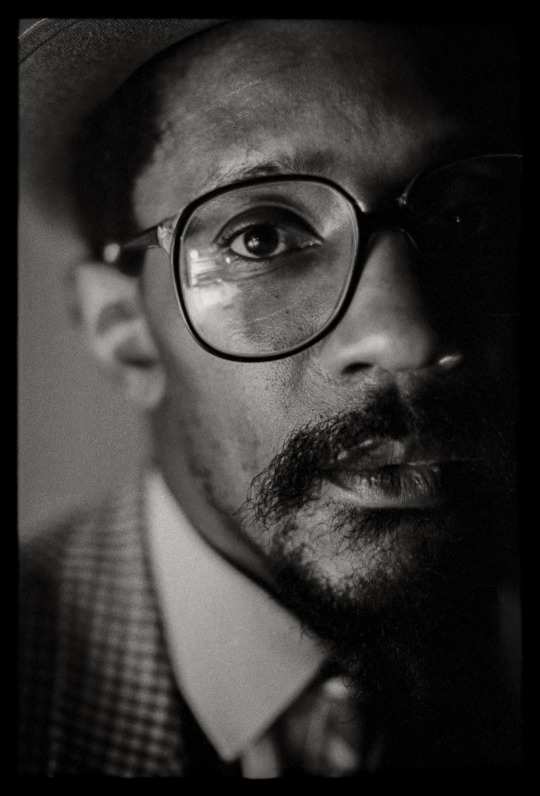
LINTON KWESI JOHNSON Toronto 1990
Toronto has had a big Caribbean diaspora for decades, so I grew up hearing calypso, soca and reggae on the streets and reggae on the radio, which is where I probably heard British dub poet Linton Kwesi Johnson for the first time. Not long after I started at Nerve magazine my editor Dave handed me an advance cassette of LKJ's In Concert with the Dub Band record, which became one of my favorite records that year. So a few years later when I was assigned by NOW magazine to photograph Jamaican dub poet Jean "Binta" Breeze (1956-2021) live at the BamBoo club on Queen West, I noticed that her backing band was Dennis Bovell's Dub Band and that LKJ was also on the bill. It was an opportunity I couldn't pass up.
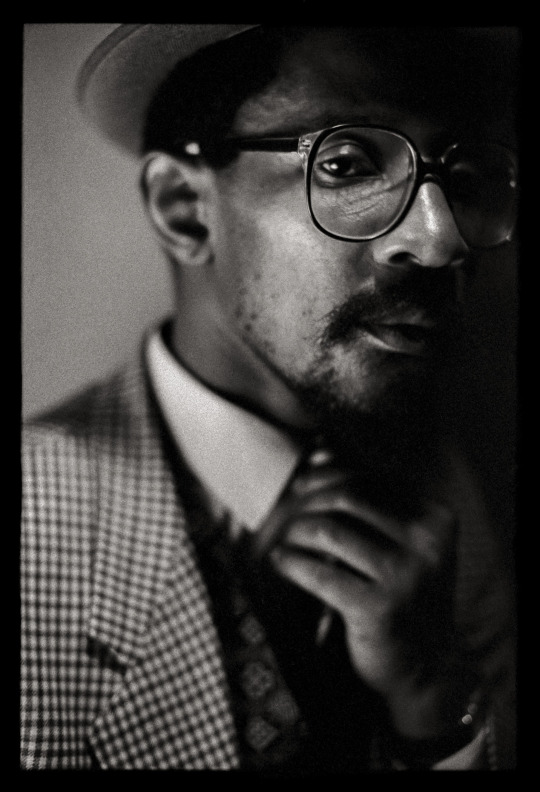
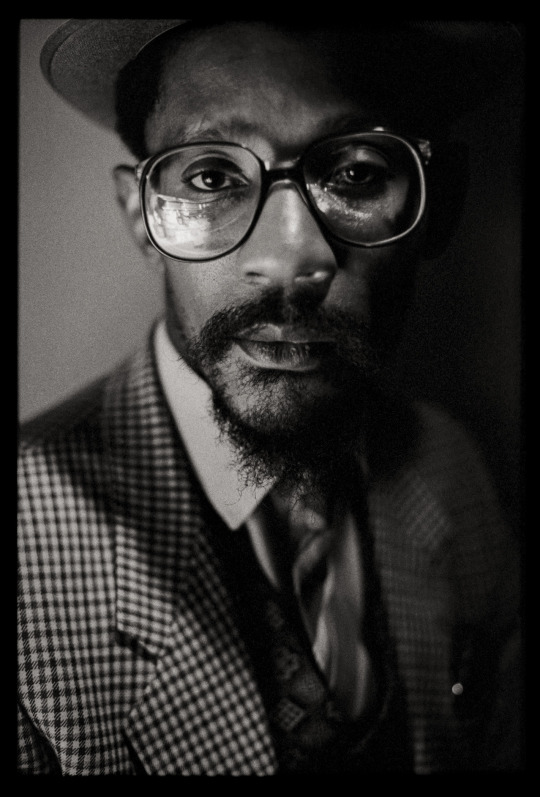
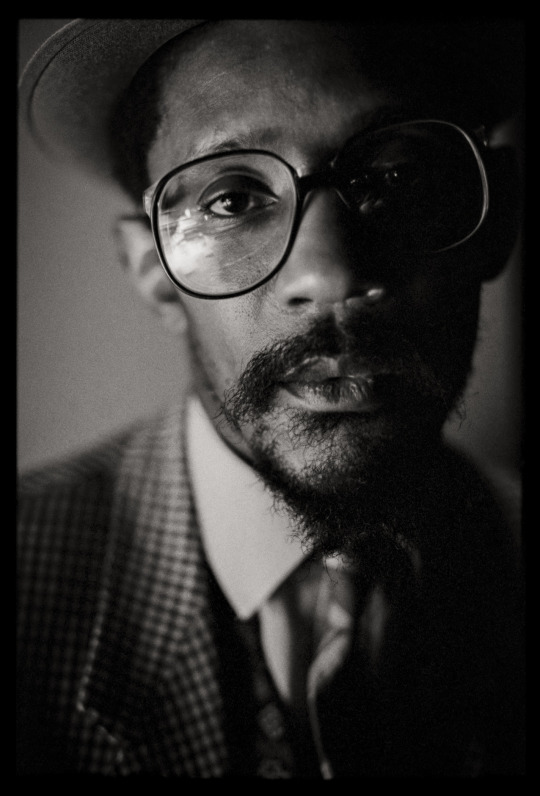
I had been shooting at gigs for years by this point and knew that if I showed up early and made my case to the promoter or road manager, I might be able to get a few minutes for a quick portrait session. The variable was always light and backgrounds, but I knew the BamBoo well enough to guess that there would be a blank wall somewhere upstairs. Light, of course, was a wild card. I got my little slot of time with Linton Kwesi Johnson before the show, and planned on taking a serious, faintly literary kind of portrait, but when I scanned the backstage area I saw that while I had enough clean white wall, there was only one spot that had just enough light for a portrait.
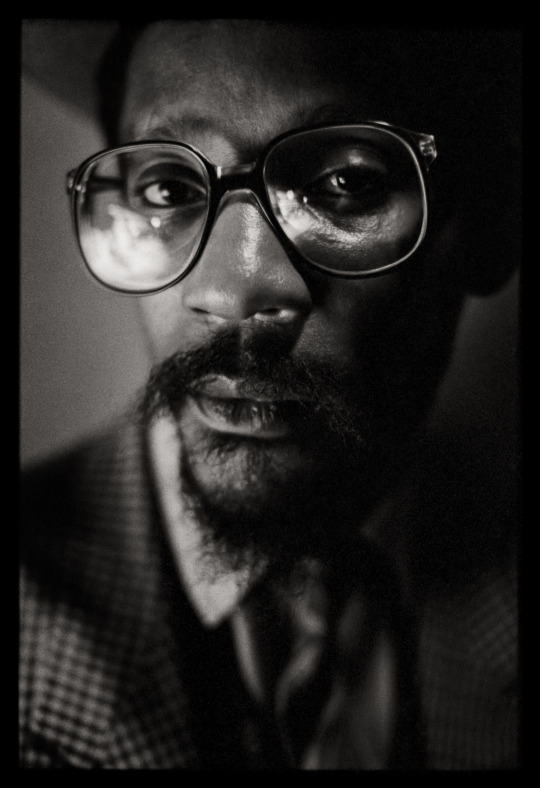
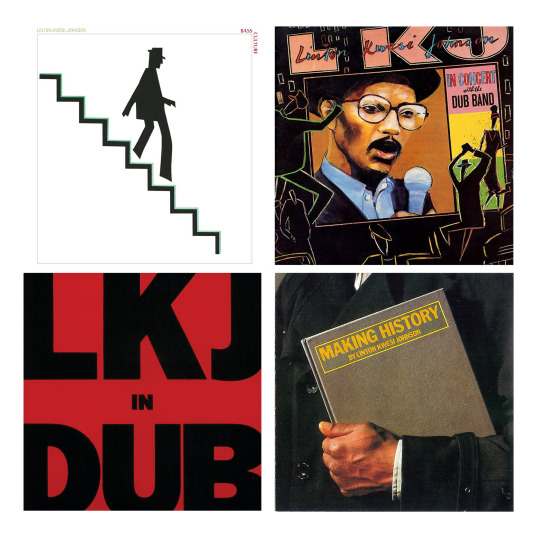

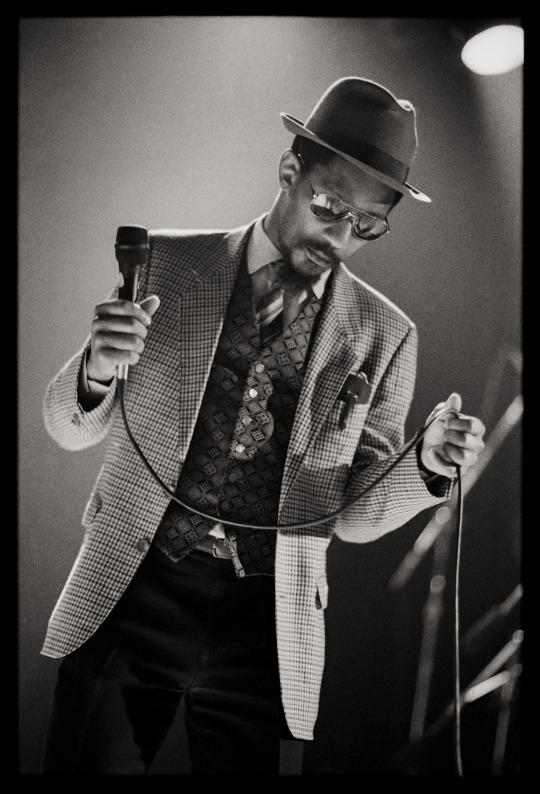
I had first read about Linton Kwesi Johnson in the British music press - weeklies like the New Musical Express and Melody Maker - so it was inevitable that I'd have those publications and their whole post-punk style in my head when I photographed LKJ: photographers like Bleddyn Butcher, Chalkie Davies, Kevin Cummins and especially Anton Corbijn. I loaded my Nikon F3 with Kodak's T-Max 3200 film, a film designed for pushing several stops (with a corresponding bloom of very textural grain). For his part LKJ was a more than accomodating subject, starting the roll with a few wistful poses before I began nudging him in the direction of the kind of austere head shot I had in mind. The roll finished, I thinked him for his time and hung around to do my job and photograph the night's show.
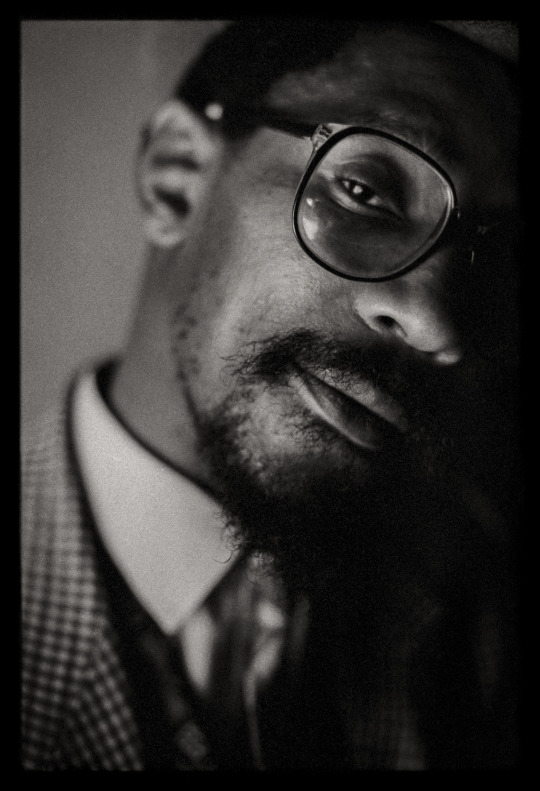
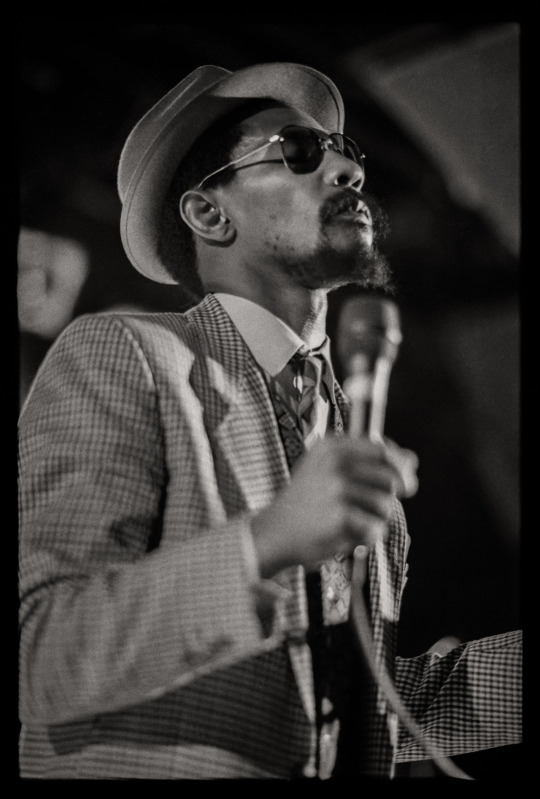
Since a portrait of LKJ wasn't what the paper assigned me to take, these shots didn't have a home. I remember printing one for my portfolio but taking it out after a few months; I kept having to explain who LKJ was and worried it was taking away from the impact of my book. Another way I was always second-guessing myself as a young photographer; I should have had more conviction. In any case these shots didn't see the light of day until I posted them on my old blog about a decade ago. Linton Kwesi Johnson continues to perform and teach, and has received countless awards and honorary degrees. Time Come, a collection of his poetry, was published last year.
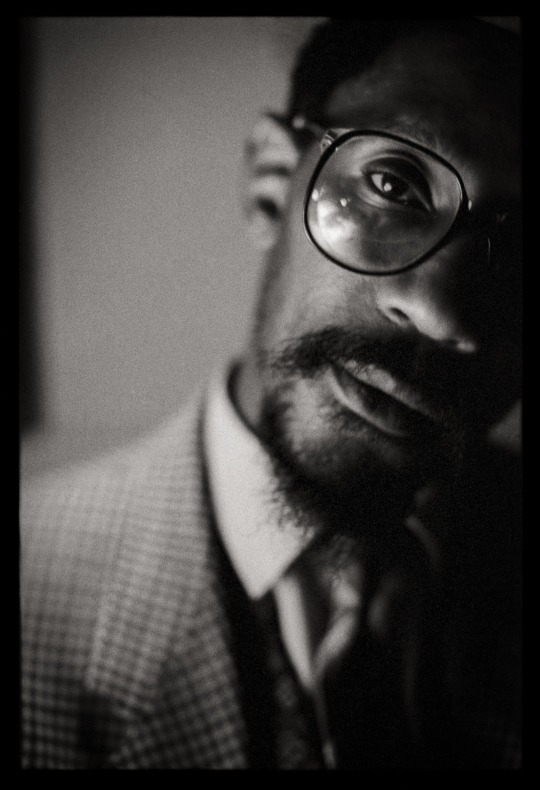
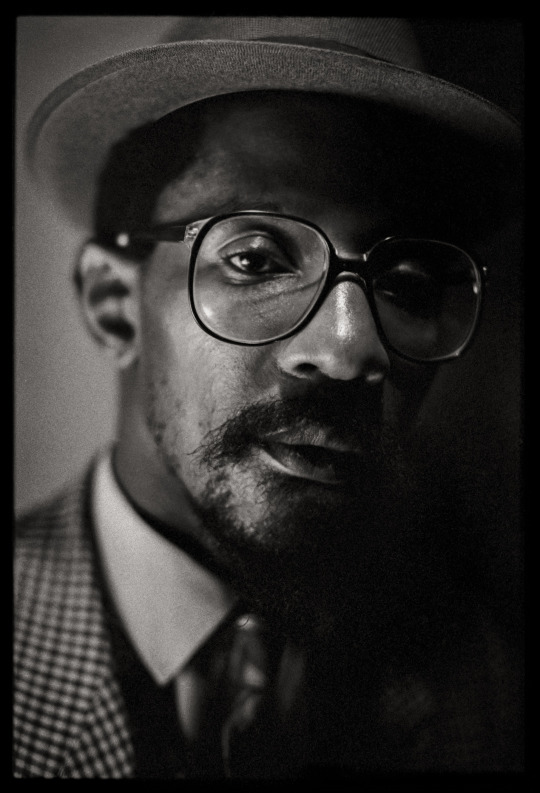
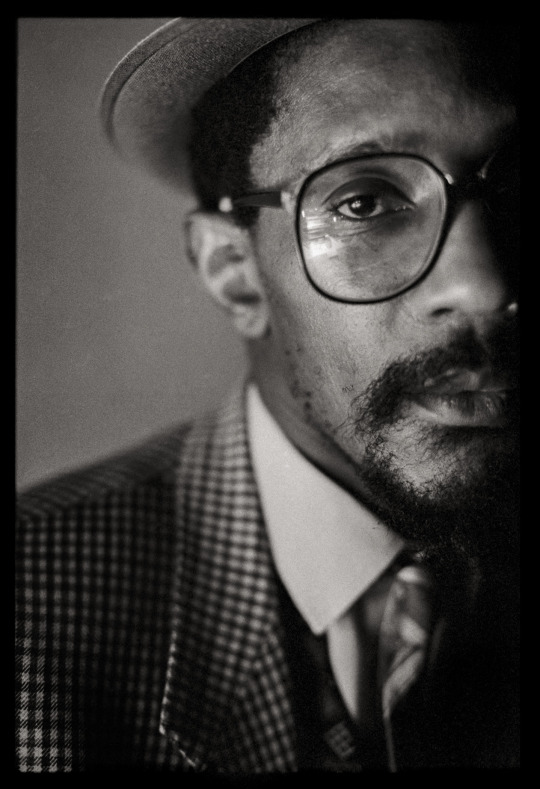
#linton kwesi johnson#reggae#portrait#portrait photography#black and white#film photography#some old pictures i took#dub poetry#nikon f3#early work
8 notes
·
View notes
Text
quite contrary: mary macdonald + historical context, music
this is my Mary MacDonald playlist and I'd like to talk a little about my interpretation of her and her cultural/historical context! it might not align with fanon, ive no idea but idc frankly haha. I hope to have done my due diligence in terms of research (i'm an absolute research fiend) and in general this is a topic I'm personally highly interested in. because it's highly interesting and (ime) little-discussed. I'll be providing links for further reading. tagging @goldenromione bc she asked me to do this!
so in my fic Mary is a muggle-born girl from a British-Caribbean family in Croydon. Her family owns a Caribbean restaurant in Thornton Heath. She's rebellious and punky and gets a lot of this from her two older brothers, both Muggles; Toby, the eldest, is part of the Race Today Collective in Brixton, dedicated to the publication of a political magazine (Race Today) on race relations in the UK. The middle brother, Lewis (who has a fling with Sirius as a matter of interest lol) is a musician/DJ very active in the Ska Revival/Two-Tone scene of the late 70s-early 80s.
All this is very influential on Mary; she is very outspoken about muggle-born rights at school, and her music taste reflects her background. I do think she would like women-led punk especially x-ray spex, but also in terms of ska a group I think she'd have liked is the selecter, which features pauline black the coolest female vocalist i've ever seen in my entire life. just look at her:
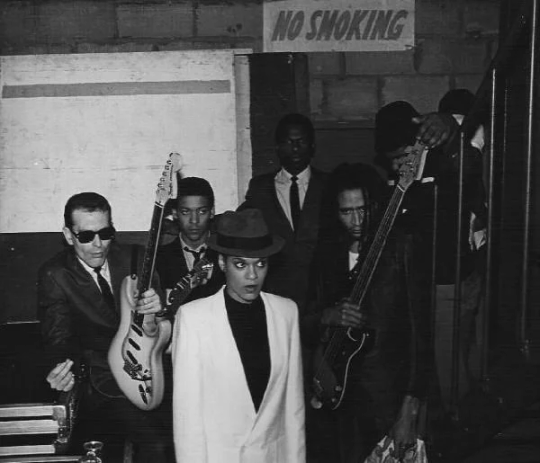
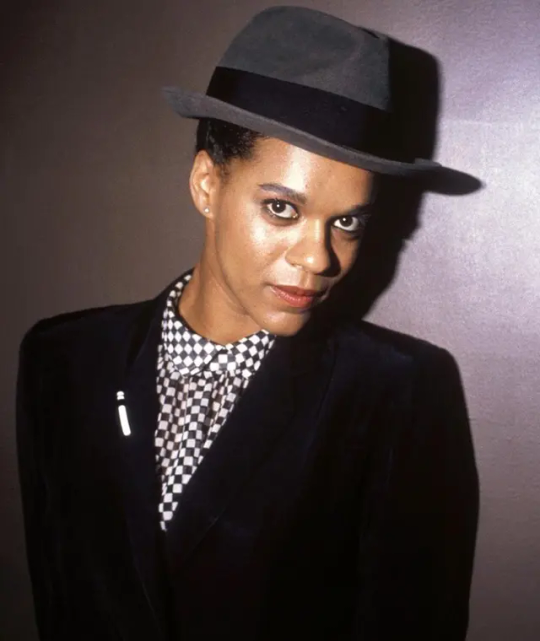
this will be explored in the upcoming 4th part of my fic, in which we see Sirius in his Brixton flat, and Mary and Lewis both spend a lot of time there. Specifically, he lives on Railton Road, which was a very important street in terms of both Black and LGBT history in Britain. It was the scene of the 1981 Brixton Riot and the location of many collectives at different points like the British Black Panthers, the 121 Centre (one of London’s longest running squats, also housed anarchist groups and other orgs), the aforementioned Race Today Collective, the Pink Fairies/South London Gay Community Centre, among others. It was also the home of many important Black British activists and historical figures like C.L.R. James, Darcus Howe and Leila Hassan. A few links:
A Radical History of 121 Railton Road By the Waters of Babylon; The Battle of Railton Road; International Centres Today in London gay history: the South London Gay Centre evicted, Brixton, 1976 Activist Streets (on history in Thornton Heath, linked above)
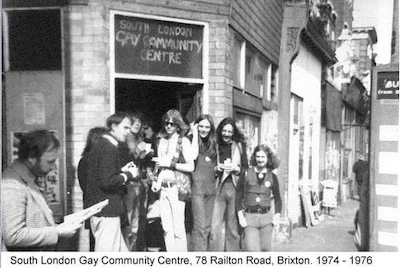

If anyone is interested in this topic I cannot, cannot recommend enough the miniseries Small Axe on Amazon, which covers a few different important moments in Black British history from the 60s to the 80s. It's so incredibly good and the soundtrack is SUPREME. Another good one to get a feel for the period is In the Long Run, created by Idris Elba and set in London in the 80s, loosely based on his own childhood.
Lastly, a few images of how I see Mary under the cut:
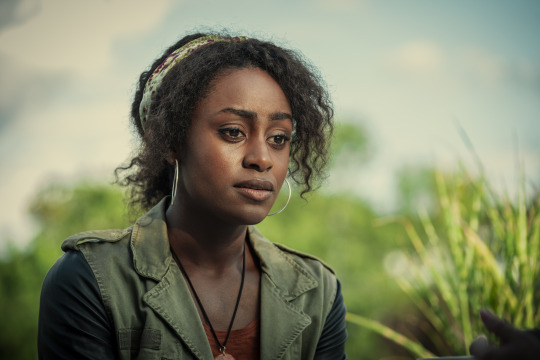



this is simona brown, my mary fancast, though the image I used for my playlist is of brenda sykes who I also think is an absolute Mary vibe.
#mary macdonald#mary#marauders era#mine#the darkest days#idk how to tag this tbh im just leaving it like that#the stranglehold that typeface has had on london signage lmao#i always thought it was futura but its johnston apparently#Spotify
37 notes
·
View notes
Text

Richards was born in and grew up in Dartford, Kent. He studied at the Dartford Technical School and Sidcup Art College. After graduating, Richards befriended Jagger, Bill Wyman, Charlie Watts and Brian Jones, and joined the Rolling Stones. As a member of the Rolling Stones, Richards is the only member, aside from Jagger, to sing lead on some Stones songs. Richards typically sings lead on at least one song a concert, including "Happy", "Before They Make Me Run", and "Connection". Outside of his career with the Rolling Stones, Richards has also played with his own side-project, The X-Pensive Winos. He also appeared in three Pirates of the Caribbean films as Captain Teague, father of Jack Sparrow, whose look and characterization was inspired by Richards himself.
In 1989, Richards was inducted into the Rock and Roll Hall of Fame, and in 2004 into the UK Music Hall of Fame with the Rolling Stones. Rolling Stone magazine ranked him fourth on its list of 100 best guitarists in 2011. The magazine lists fourteen songs that Richards wrote with the Rolling Stones' lead vocalist Jagger on its "500 Greatest Songs of All Time" list.
🎂
2 notes
·
View notes
Video
youtube
Harry Belafonte on His Artistic Values and His Activism
In interviews and articles in The New York Times, Mr. Belafonte, who died on Tuesday, spoke about the civil rights movement and his frustration with how Black life was depicted onscreen.
Harry Belafonte, the singer, actor and activist whose wide-ranging success blazed a trail for other Black artists in the 1950s, died on Tuesday at age 96.
A child of Harlem, Mr. Belafonte used his platform at the height of the entertainment world to speak out frequently on his music, how Black life was depicted onscreen and, most important to him, the civil rights movement. Here are some of the insights Mr. Belafonte provided to The New York Times during his many decades in the public spotlight, as they appeared at the time:
His music
Mr. Belafonte’s string of hits, including “Day-O (The Banana Boat Song)” and “Jamaica Farewell,” helped create an American obsession with Caribbean music that led his record company to promote him as the “King of Calypso.”
But Mr. Belafonte never embraced that sort of monarchical title, rejecting “purism” as a “cover-up for mediocrity” and explaining that he saw his work as a mash-up of musical styles.
He told The New York Times Magazine in 1959 that folk music had “hidden within it a great dramatic sense, and a powerful lyrical sense.” He also plainly conceded: “I don’t have a great voice.”
In 1993, he told The Times that he used his songs “to describe the human condition and to give people some insights into what may be going on globally, from what I’ve experienced.”
Sign up for the Watching newsletter, for Times subscribers only. Streaming TV and movie recommendations from critic Margaret Lyons and friends. Get it in your inbox.
He said that “Day-O,” for instance, was a way of life.
“It’s a song about my father, my mother, my uncles, the men and women who toil in the banana fields, the cane fields of Jamaica,” he said. “It’s a classic work song.”
His views on film and television
Mr. Belafonte’s success in music helped him become a Hollywood leading man. In the 1950s and 1960s, Mr. Belafonte and his friend Sidney Poitier landed more substantive and nuanced roles than Black actors had previously received.
Nonetheless, Mr. Belafonte was left largely unsatisfied.
Writing for The Times in 1968, he complained that “the real beauty, the soul, the integrity of the black community is rarely reflected” on television.
“The medium is dominated by white-supremacy concepts and racist attitudes,” he wrote. “TV excludes the reality of Negro life, with all its grievances, passions and aspirations, because to depict that life would be to indict (or perhaps enrich?) much of what is now white America and its institutions. And neither networks nor sponsors want that.”
Mr. Belafonte emphasized that his 10-year-old son saw few Black heroes on television.
“The nobility in his heritage and the values that could complement his positive growth and sense of manhood are denied him,” he wrote. “Instead, there is everything to tear him down and give him an inferiority complex. He will see the Negro only as a rioter and a social problem, never as a whole human being.”
Roughly 25 years later, Mr. Belafonte was circumspect, suggesting in an interview with The Times that little had changed.
“Even today, on the big screen, the pictures that are always successful are pictures where blacks appear in the way white America buys it,” he said in 1993. “And we’re told that what we really want to express is not profitable and is not commercially viable.”
His politics and activism
Even as Mr. Belafonte was in the prime of his entertainment career, he was intently focused on activism and civil rights.
“Back in 1959,” Mr. Belafonte told The Times in 1981, “I fully believed in the civil-rights movement. I had a personal commitment to it, and I had my personal breakthroughs — I produced the first black TV special; I was the first black to perform at the Waldorf Astoria. I felt if we could just turn the nation around, things would fall into place.”
But Mr. Belafonte lamented that by the middle of the 1970s, the movement had ended.
“When the doors of Hollywood shut on minorities and blacks at the end of the 70’s,” he said, “a lot of black artists had been enjoying the exploitation for 10 years. But one day they found the shop had closed down.”
Mr. Belafonte remained outspoken about politics in his later years. In 2002 he accused Secretary of State Colin L. Powell of abandoning his principles to “come into the house of the master”; he called President George W. Bush a “terrorist” in 2006, and lamented in 2012 that modern celebrities had “turned their back on social responsibility.”
“There’s no evidence that artists are of the same passion and of the same kind of commitment of the artists of my time,” he told The Times in 2016. “The absence of black artists is felt very strongly because the most visible oppression is in the black community.”
In 2016 and again in 2020, he visited the opinion pages of The Times to urge voters to reject Donald J. Trump.
“The vote is perhaps the single most important weapon in our arsenal,” Mr. Belafonte told The Times in the 2016 article. “The same things needed now are the same things needed before,” he added. “Movements don’t die because struggle doesn’t die. ”
41 notes
·
View notes
Text
240619 "THE BOYZ Younghoon's Blue": Younghoon Interview for BEAUTY+ July 2024 Issue [Full Translation]

This is already the magazine’s July issue. Summer is here. What comes to mind when you think of “summer”?
Younghoon: I have a vague memory of jumping off the diving board in Everland’s “Caribbean Bay”. I can’t forget the first time I challenged something like that in my life.
This is also the season of vacation. What kind of traveler is Younghoon?
Younghoon: “Spontaneous traveler”. (laughs) I’m the type to not do anything during travels and just rest while looking at a beautiful view. That’s why I like resorts/holiday destinations. Recently I went on a trip to Gangneun with New and Q, and they made all the plans instead of me.
Do you match well with those two members?
Younghoon: Q has a similar style to mine, New is a bit different, but thankfully he followed us well. So we could really enjoy ourselves comfortably.
If you were to go on a trip with another member(s), who would you like it to be and where do you want to go?
Younghoon: I want to go to Sapporo or Okinawa with Sunwoo. Sunwoo is also the spontaneous type so we match well, and surprisingly, if I follow Sunwoo, the place always ends up being beautiful. So I think it would be fun to travel with Sunwoo.
You’ve been accumulating experiences, but what is something that is still difficult?
Younghoon: Everything I do for the first time is difficult. Of course that I think I’m less nervous than I used to be, but even so, whenever I challenge something new, for instance, a variety show, or being an MC for <Show! Music Core>, or a pictorial, things that I’m doing individually instead of as a group activity, I still get a little nervous.

You’re challenging a variety talkshow with actor Kim Heesun and comedians Lee Soogeun and Lee Eunji for the first time, right?
Younghoon: I knew that I would be together with some really incredible sunbaenims, so for the first episode I was truly so worried. But the PD had trusted and chosen me, so I wanted to do my part well. I think the most important thing when participating in a show with such a comfortable atmosphere is exactly that, not worrying too much. If I get worried, there’s nothing I can do. But Soogeun hyung, Heesun noona, Eunji noona, the writers and PDs were so nice that now I don’t feel burdened and can just enjoy the vibes of the gathering. It’s a recording, but I treat it with the mindset of “hanging out”, “chatting” with friends. Since I’m the maknae, everyone is so kind to me, and that’s something I’m thankful for.
It seems like there are moments when you miss your members while doing individual activities. (laughs) What do you think is a positive aspect you receive from the members?
Younghoon: We do many things together, so there are moments when I’m tired or struggling in which just having the members by my side is enough to give me strength. When I’m alone, I need to comfort myself and get up on my own. (laughs) I tell myself “you can do it, you gotta try”. But when the members are there, they’re the ones doing that kind of comforting and cheering. So by receiving that kind of energy I can work hard together with everyone.
You’re known as an idol who communicates very earnestly with fans. What kind of existence are the fans to Younghoon?
Younghoon: I’m also receiving love every day, and for that reason I want to repay the fans with love every day as well. Moreover, on my birthday so many fans congratulate me, while I can’t actually congratulate those who like me on their birthdays. So I started sending messages daily because I wanted to wish them a happy birthday. I’m like a sprout that’s still growing. (laughs) The fans are an existence like the sun. I will keep growing even bigger while looking at the fans.

Like the fans keep sending Younghoon warm love, is there anything Younghoon has been falling in love with recently?
Younghoon: There have been many things like that recently. With a mindset of trying to spend my time alone productively, I’ve been trying to put that into practice with a few different things. One of those is boxing. I’m working out diligently too. Instead of spending a day doing nothing, I think it’s important to make sure to do something and get a sense of accomplishment, to feel “I achieved that”. Even if it’s something really small.
Half of the year has already passed by. How do you want to spend the rest of the year?
Younghoon: Starting now, I’m about to get really busy. We’re doing a world tour until September. I’m looking forward to all the concerts in different cities around the world, and as a team we’re hoping that we can develop even more than how we are now. Personally, I want to fill the remainder of the year with happy memories.
Now for the last question. In order to spend this tiringly hot season, please recommend us Younghoon’s personal summer playlist.
Younghoon: “Blue Island (파란섬)” by Airman (공기남). If you listen to it, summer just seeps into your mind. And I start smiling without reason. I’ve recommended it a lot to the fans, but I hope everyone, no matter who, can listen to it. (laughs)

-
(source; translation may contain inaccuracies!)
3 notes
·
View notes
Text


MY SONG OF THE WEEK: “Night Garden” https://johnnyjblairsingeratlarge.bandcamp.com/track/night-garden-featuring-mike-garson-beyondo I was playing cruise ship gigs and a bass line kept flowing out of me. Every time I played this groove, musicians would start jamming, people would start dancing… It turned into this psychedelic Cuban-jazzified pop song. Latin and Caribbean music is animated and easeful to me, rhythmically and harmonically, making me feel I’m moving with confidence no matter what’s going on in the world. My lyrics were inspired after reading an airline magazine article by Lee May, a journalist from Atlanta who was passionate about gardening. His wonderful words about “plant life that blooms at only night” left an impression. As to the lyrics, Donald Fagen says he chooses words because they suit the shape of his mouth and the lure of a melody—words flow and find their own meaning. That was my approach: Like winding tendrils, words and melody twined into “a song novelette” about a pair of lovers heading south of the border, on the lam because of an unspecified crime.
The music bed was recorded in Brooklyn, Los Angeles, and Williamsport PA (final mix by Xavier Francis). It features the brilliant drum/trumpet/co-production work of Eric Biondo (a.k.a. Beyondo) + magnificent piano by Mike Garson, a composer-artist in his own right but also known as David Bowie’s longtime keyboardist.
https://johnnyjblairsingeratlarge.bandcamp.com/track/night-garden-featuring-mike-garson-beyondo
#nightgarden #gardening #flowers #davidbowie #mikegarson #leemay #atlanta #journalist #caribbean #latin #cuba #mexico #psychedelic #piano #exotica #ericbiondo #beyondo #trumpet #donaldfagen #steelydan #airline #cruiseship #johnnyjblair #singeratlarge #dance #brianwilson #smile #beachboys #kokomo
#johnny j blair#singer songwriter#music#singer at large#pop rock#san francisco#Night Garden#flowers#David Bowie#Mike Garson#Lee May#Caribbean#Latin#Cuba#Mexico#piano#exotica#Eric Biondo#Beyondo#Steely Dan#cruise ship#Brian Wilson#Beacy Boys#Kokomo
2 notes
·
View notes
Text
Exploring the Rhythms: A Caribbean Music Magazine Journey

Welcome to the vibrant world of Caribbean music, where rhythm, melody, and culture converge to create an unparalleled musical experience. In this inaugural issue of our Caribbean Music Magazine, we embark on a rhythmic journey through the diverse sounds and rich traditions of the Caribbean islands. From reggae to soca, calypso to dancehall, join us as we celebrate the heartbeat of the Caribbean through insightful articles, exclusive interviews, and captivating features.
Unveiling the Melodic Tapestry: A Brief History of Caribbean Music Embark on a historical odyssey tracing the roots of Caribbean music, from its African and European influences to its evolution into a global phenomenon. Explore the key genres, iconic artists, and pivotal moments that have shaped the vibrant musical landscape of the Caribbean.
Soca Sensation: The Rise of Caribbean Carnival Music Delve into the electrifying world of soca music, the pulsating soundtrack of Caribbean carnivals. Learn about its origins, rhythmic elements, and cultural significance, as we spotlight the artists and anthems that ignite the carnival spirit across the Caribbean and beyond.
Reggae Revolution: Exploring Jamaica’s Musical Legacy Journey to the birthplace of reggae music, Jamaica, and uncover the enduring legacy of this iconic genre. From Bob Marley to Buju Banton, delve into the lives and music of reggae’s trailblazing pioneers, as we explore its profound impact on music, culture, and social change.
Island Grooves: Exploring the Diversity of Caribbean Music Venture beyond Jamaica’s shores and discover the kaleidoscopic array of musical styles that thrive across the Caribbean islands. From the infectious rhythms of Trinidadian calypso to the hypnotic beats of Cuban salsa, immerse yourself in the diverse sounds and traditions that define Caribbean music.
Spotlight on Caribbean Artists: Exclusive Interviews and Features Get up close and personal with some of the Caribbean’s most talented artists as we bring you exclusive interviews, behind-the-scenes insights, and in-depth features. From rising stars to seasoned veterans, discover the stories behind the music and the passion driving the Caribbean music scene forward.
Conclusion: As we conclude this inaugural issue of our Caribbean Music Magazine, we invite you to continue exploring the rhythmic wonders of the Caribbean through our upcoming issues. Whether you’re a seasoned aficionado or a curious newcomer, join us on this musical odyssey as we celebrate the rich heritage, vibrant creativity, and infectious rhythms of Caribbean music. Contact us to learn more!
0 notes
Text
FIONA HORNE
FIONA HORNE
24 June 1966
DEF FX
Fiona Horne is an Australian singer who is best known for being the lead vocals in the band Def FX who had hit songs with I’ll Be Your Magick (2003) & Psychotic summer (1995). She also did a duet with Paul McDermott with Shut Up / Kiss Me (1998) which is one of my favourite songs. She appeared on Celebrity Survivor in 2006 and is a self-confessed witch who wrote the successful book Witch: a Magickal Journey: A Hip Guide to Modern Witchcraft (2001).
Horne was born in Sydney, Australia and started playing in bands when she moved to Adelaide, South Australia in 1984. In 1990, she co-founded the alternative-dance-rock band Def FX. The band played at the Big Day Out (1994) and later disbanded in 1997. Horne went on to appear on Good News Week with Paul McDermott and started releasing her own solo music. Def FX reformed in 2012 for a national tour as well as in 2019. In 1994, Horne featured in the well-known Black+White magazine and then moved to Los Angeles in 2001 and worked regularly in the Caribbean at resorts. Today she lives in Western Australia with her boyfriend.
Horne is a vegetarian and wrote her autobiography The Naked Witch (2017). Horne is a commercial pilot, humanitarian aid worker, skydiver, fire dancer, yoga instructor and free diver.

#fionahorne #DefFX
2 notes
·
View notes
Text
Erica Mena is the example of when pretty privilege doesn't work for you. Being pretty is nice, but you also gotta have a personality to match it. You gotta be likeable. You gotta have some type of substance. According to society, a woman like Erica Mena should be living a very lavish life, with a rich or wealthy husband.
I think there are many reasons why this hasn't happened for her.
Her attitude is nasty. Rich men don't want a wife who is loud and obnoxious. That makes them look bad. A trophy wife is supposed to be quiet and look pretty.
She marked herself to black men and urban entertainment. She was in rappers music videos and mostly modeled for urban magazines and brands. She never branched out. She was okay with black men lusting after her.
Erica Mena is mad because black men have been putting her on a pedestal since birth. So when a black man, would rather spend time with a dark skinned black woman, than her. She just can't accept that. She is like a little child having a temper tantrum. She believes she should be the chosen one, not Spice.
I also don't think Spice and Safaree have anything going on. They are both from the same country, so they are just doing what Caribbean people do when they run into each other.
8 notes
·
View notes
Text
29/04/2000 - KERRANG! MAGAZINE “New York Doll”


New York Doll
According to Courtney Love, Katie Jane Garside is the original Riot Grrl. According to her detractors, she’s a new age nutter with volatile tendencies. As her band prepares to storm the Big Apple, one thing’s certain - the QUEEN ADREENA frontwoman isn’t about to change for anyone…
“WE’RE ON a planet in the middle of infinity.” Katie Jane Garside observes, not unreasonably. “Nobody really knows what the hell is going on, but as long as I’m properly chewing on life, I’m okay. Happiness or sadness isn’t the point to me. That’s why it’s good to come to a place like New York. It keeps you right on the edge of creation. To realise your mortality is great.” Katie Jane is in New York with her band Queen Adreena to their first US gigs. The slender vocalist has certainly been chewing on life in the few hours since she arrived. Last night her performance mesmerised a 100-strong audience at Brownie’s club, after which the band moved on to a trendy, hole-in-the-wall bar in a rundown part of the city where a drunken Katie made such an arse of herself that she was put in a cab and sent back to her hotel by her bandmates. “I have no dignity today.” she croaks over a lunch of coffee and water in the Big Apple’s chic Paramount hotel. “I shredded it last night. When I’m drunk, to repress any of my urges seems like a crime against God. I can become quite dangerous to myself.”
IF YOU believe Courtney Love, Katie Jane Garside was the original Riot Grrl. In the early ‘90s, she fronted Daisy Chainsaw, whose screechy, punky rock was an innovation to Courtney and others. But there were problems. Because she didn’t write any of the songs, Garside left frustrated in Daisy Chainsaw. “I was unable to articulate myself,” she sighs. “It became a bottleneck of violence. I took it out on myself to a dangerous degree. That’s why I left. My silent witness, the one up there that sits by my right ear, just told me to out.” Spooked by the music business, she headed for the solitude of the Lake District where she stayed, along, for several months. “I went away to find what was at the bottom of the well,” she explains solemnly. “I had to be very quiet and far away from everything in order to hear something that wanted to speak to me. I just walked up and down mountains. That’s all I did. Walk and write and scream into the wind. It was very magical. When you subtract from your life, it creates an altered state just as drugs do by adding something. I was able to lost myself. On good days it was divine. I write from that place. It’s a personal mythology. It’s very real.”
She toys with the fake flower in her hair and gazing down at her feet. Momentarily, she’s lost. “Where am I going?” she questions herself. “Let me see…” A long pause. This happens often when Katie Jane Garside is grappling with a big idea like art or creation. She strives hard to be understood.
When she returned to London from the Lakes, Katie put a new group together with former Daisy Chainsaw guitarist Crispin Gray, plus drummer Billy Freedom, and tall, cross-dressing bassist Orson Wajih. Named Queen Adreena after a premonition of Katie’s, they have produced the most startling rock debut of the year in 'Taxidermy’, a record full of volatile emotions and uncommon beauty. “Music is the only thing that’s been consistent in my life,” Katie explains. “It’s been my sanctity, my lullaby that’s kept me same.”
KATIE JANE has never been like the other girls. As an army child, her adolescence was disrupted each time her father was posted to a new country. Always the new kid at school, Katie remembers: “I was very angry about something and I didn’t know what it was. I don’t think I was great to know.” Between 12 and 15 Katie’s family lived mostly on a boat in the Canary Islands and in the Caribbean. Now 31, her closest friend is her younger sister Mel, a singer-songwriter who also lives in London. “I don’t really know many people,” Katie shrugs. “I know my sister and usually about one other person at any given time. We’re very connected. In fact Mel and I are almost the same person.”
Katie feels the same way about the late Anais Nin, author of some of the most celebrated erotic writing of the 20th Century, although Katie prefers Nin’s journals to her erotica. “I love her,” Katie smiles. “Something strange happened to me when I read her. I met myself. You don’t often meet yourself. It gave me a lot of comfort. Her stuff is so timeless. Her diaries are extraordinary. She was really alive every minute of her life.”
DESCRIBED BY The Guardian as “a complicated heroine”, Katie Jane Garside is an unusual rock star. She gave up drugs, she says, because they got her into too much trouble. “I’m too open,” she confesses. “They’d finish me off.” In the past, Katie Jane has been written off as a nutter, but while many of the things she says will read like so much kooky new age nonsense in the pages of a rock magazine, when she speaks of the power of nature and her desire to be alone with it, there is a fire and a genuine belief in her clear eyes. “I’m very happy on my own,” she says.
“That makes it difficult to have any relationship with any sense of permanence, but it doesn’t make it difficult for me, it makes it difficult for them. It does make me sad, but I can’t be any other way. "My religion is nature. I’m at the mercy of it, and when I feel my best is when I feel most insignificant, when I become a grain of sand, nothing. That’s my religion. Everything is temporary. There is an omnipotence. I felt that in the most real way possible.” People hate me for saying things like that, but if you truly lose yourself there’s nothing that anyone can do to you. As soon as I see a no-go sign, I have to go there. “I’ve woken up and been God,” she says. “It was a long night when everything collapsed, and it wasn’t drug-induced. There is real magic. It’s something that manifests very visibly.”
ALL OF a sudden, Katie looks up. She has a story to tell. She thinks it probably won’t make sense if the story is printed, but she tells it in the hope that somebody will understand. “I was in a very difficult period of my life,” she reveals. “I was more frightened that I’ve ever been. I was walking on Hampstead Heath and I was singing to myself, and I looked up and saw a bird which I felt was looking right at me. "Then as I crossed over a bridge, this flock of birds descended on me. I was cloaked in it. I was crying and crying and this man was staring at me through this haze of birds. "This really happened,” she exclaims. “The God experience. I’m part of creation. I wasn’t born and I don’t die. I’m here forever. And in that moment the universe rushed to me and enveloped me and let me know that I’m not alone.”
6 notes
·
View notes
Text
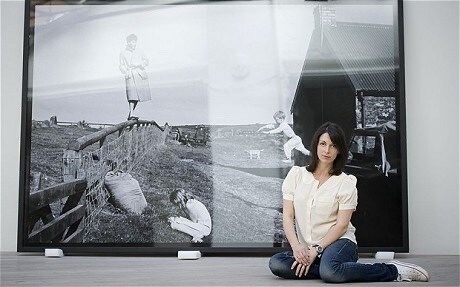
Linda McCartney: a life through the lens
As a collection of Linda Eastman's best photographs - as chosen by her family - goes on display in a London gallery, her daughter Mary McCartney tells Roya Nikkhah that her mother's motto was always "Keep it simple"
By Roya Nikkhah and Royanikkhah
04 June 2011 • 9:00pm
Mary McCartney, who has curated an exhibition of her mother's photographic work: Photographs by Linda McCartney
In May 1968, Linda Eastman became the first female photographer to feature on the cover of Rolling Stone magazine with a portrait of Eric Clapton. Less than a year later, she married one of the most famous men in the world to become Linda McCartney, and was thereafter known primarily as a Beatle’s wife.
“No one knew I was a photographer,” Linda once said. “When I married Paul, to [the fans] I was an American divorcee.”
McCartney died of breast cancer in 1998 aged 56, but her family are determined to ensure that her accomplishments as a photographer live on. For the last year, McCartney and his daughters Mary, a photographer, and Stella, a fashion designer, have sifted through Linda’s archive of more than 200,000 images, to collate Linda McCartney: A Life In Photographs, a book of some of her best work, accompanied by limited-edition prints.
The retrospective encapsulates her work as a leading music photographer, with iconic images of Jimi Hendrix, Jim Morrison, the Rolling Stones and, of course, The Beatles. But while it covers studio sessions with the likes of Stevie Wonder and Michael Jackson, it is also an intimate family album, with touching and many previously unseen pictures of the McCartneys raising their young children – Heather, Mary, Stella and James – at their farm in Scotland, on holiday in the Caribbean and at home in London.
Mary, who talks openly of her mother’s huge influence on her own career, is wandering around the cavernous white space of the Phillips de Pury gallery in London, where a selection of the prints are being hung, among them Linda’s famous photograph of a baby Mary peeking out from inside her father’s sheepskin jacket, which later illustrated the cover of his first solo album, McCartney, in 1970. “It looks so cosy, doesn’t it?” says Mary. “That’s how they’d go riding together – zip me in there and go for a little horse ride.”
Mary speaks movingly of her regret that her mother’s work wasn’t more widely recognised, so often overshadowed by the McCartney name. “She didn’t self-promote or do lots of interviews, she never blew her own trumpet, and so she was often pigeonholed as a celebrity who dabbled in photography, which isn’t how it was at all.
“People didn’t realise that it was through her photography career that Mum and Dad met and that she was a photographer way before she had a family with Dad. But she wasn’t that bothered about what other people thought about her, it’s more probably us, her kids, who got irritated.”
Linda’s break came in 1967, when she was the only photographer allowed on to a boat on the Hudson River in New York where the Rolling Stones were performing. The candid photographs of the band at work and at play paved the way for commissions from Rolling Stone and other leading glossy magazines.
“People know quite a lot of her Sixties work, but Stella, Dad and I were interested in showing a broader spectrum, as well as those iconic images,” says Mary. “When she got married, she stopped being a jobbing photographer doing all the bands in New York. When she moved to London, she carried on with a very similar style and eye, but her subject changed. She was still photographing the people around her, which were her family and friends.”
A previously unseen photograph of Twiggy shows the young model relaxing off-duty during a visit to Linda in London shortly after Mary was born in 1969. Another shows her young brother, larking around with McCartney in a bubble bath in 1983. “This one really shows her style,” says Mary. “Mum’s motto was always 'keep it simple’ which I stick to. She would never pose us all.
“With Dad and James in the bubble bath, she would just walk by and have thought visually that was quite strong and have taken the picture. She’d always have the camera on her so these are all like pictures she’d take as she was wandering through life.”
Mary moves towards a black-and-white picture taken at their farm in Scotland in 1982, showing Paul standing on a fence in his dressing gown, while Stella crouches on the ground and a young James, in his pyjamas, leaps off the family Land Rover. “This one is genius, but she won’t have set it up – it will have just been everybody there. That fence was really wobbly and we used to have a competition to see who could walk the longest along it before you fell off. It wasn’t very stable. I never, ever got all the way along.”
Mary remembers watching her mother at work; her subjects would barely register they were being captured on film. “She would have the camera with her but wouldn’t hold it up in your face for a long time, so she wouldn’t be clicking all around you – she’d chat with you, take a snap, put the camera down, so you didn’t have time to start posing and feeling self-conscious. She never intimidated people.”
Linda herself spoke of always trying to penetrate beneath the “veneer” of celebrity subjects like Jim Morrison, lead singer with The Doors, and her friend Jimi Hendrix. “People could confide in her, because she wasn’t a gossip,” says Mary. “Hendrix in particular became a bit disenchanted [with photographers] because they always wanted him to 'perform’ – be all rock and roll – but she was friends with him because she loved his playing, so he didn’t need to be like that with her.”
I wonder if Linda ever regretted relinquishing her successful career in New York after marrying Paul? “Talking to Mum, she had become a bit disenchanted with the music industry by that time,” says Mary. “She found that as the years went on, there were more lawyers and PRs around the record companies, who were more and obstructive.
“She was also being asked to get much more sensationalist pictures, which she wasn’t interested in doing. She told me people would try and get her to go to Andy Warhol’s Factory and take pictures of people shooting up, which wasn’t her style. It was enough to make her feel uncomfortable. She needed to be enjoying it to stay stimulated, so I think she’d got to a point where she’d done her bit.”
One of Mary’s favourite works in the gallery is Whisky and Milk, Scotland 1978, a black-and-white shot of an empty whisky bottle and a milk bottle side by side on the kitchen table. “I love that and it’s one of Stella’s favourites, too. It shows her quirky side and her sense of humour. She always thought that was quite entertaining, you know, the contrast of both bottles equally enjoyed by different age groups.
“This is one of my favourites too,” she says, moving over to Paul’s Feet, where McCartney grips a glass with his feet, toe-nails varnished in rainbow colours. “It kind of says a lot about Mum and Dad.”
Mary published From Where I Stand last year, a retrospective book accompanying an exhibition of her own work. While editing the book and show, she noted the similarity between some of her pictures and her mother’s. “I looked at some shots and thought, 'that was a picture Mum could have taken,’ but the difference between us is that she wouldn’t care about missing a shot, whereas if I see something and I haven’t got a camera, I can get quite stressed.
“She was very chilled, she’d say: 'It’s a soul camera moment’. Now, if I get annoyed that I’ve missed a shot, I try and think, 'Don’t worry, it’s on the soul camera’. I say it and don’t really mean it, whereas Mum could really let it go. She had everything captured in her soul camera.”
* Linda McCartney: Life in Photographs is at Phillips de Pury (Howick Place, London SW1, www.phillipsdepury.com) from June 7 to June 16. The book is published by TASCHEN and available for £44.99 at www.taschen.com
Mary McCartney, 6/4/11 - Telegraph (x)
8 notes
·
View notes